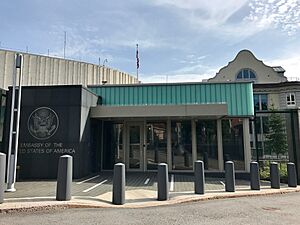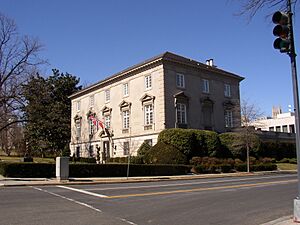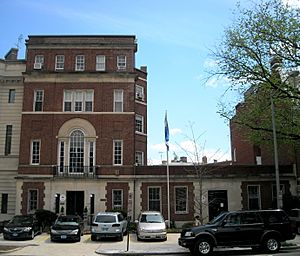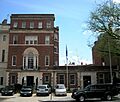Diplomatic mission facts for kids
A diplomatic mission is a group of people who officially represent their country in another country. The most common types are an embassy or a high commission. These are the main offices where a country's representatives work in another nation. An embassy is usually found in the capital city of the host country.
Sometimes, the word "embassy" is also used to mean the building itself. But strictly speaking, the embassy is the group of people, while the building where they work is called the chancery. The people who work at a diplomatic mission, called diplomats, can live in the embassy building or in separate homes. Their homes also have special protections.
Contents
What are the different types of diplomatic missions?
Countries can have different kinds of offices in another country. Each type has a specific job.
| Type of Mission | What it does |
|---|---|
| Embassy | This is the main diplomatic office. It's usually in the capital city. It offers many services, like helping citizens and handling official talks. |
| High Commission | This is like an embassy, but it's for countries that are part of the Commonwealth of Nations. For example, Canada has a High Commission in the UK. |
| Permanent Mission | This office represents a country at a big international group, like the United Nations. |
| Consulate General | This is a smaller diplomatic office. It's usually in a major city, but not the capital. It helps people with things like passports and visas. |
| Consulate | Similar to a consulate general, but it might offer fewer services. |
| Legation | In the past, this was a lower-ranked diplomatic office. It was led by a "minister" instead of an "ambassador." After World War II, most legations became embassies. |
| Honorary Consul | This is a person who helps with some diplomatic tasks. They usually offer only a few services. |
The person in charge of an embassy is called an ambassador. The head of a high commission is a high commissioner. Both have the same important status. The Holy See (Vatican) calls its missions apostolic nunciatures, led by a nuncio.
If a country is unhappy with another, it might call back its ambassador. This is a sign of displeasure. The mission still runs, but a chargé d'affaires (usually the deputy) takes charge temporarily.
Do embassies have special protection?
Embassies are very special places. They are not actually part of the country they represent. Instead, they are under the laws of the host country. However, they have special protections. These protections are given by international rules called the Vienna Convention on Diplomatic Relations.
For example, the host country's police cannot enter an embassy without permission. This is true even if there's a fire. An attack on an embassy is seen as an attack on the country it represents. This special protection is often called "extraterritoriality."
Because of these rules, people sometimes seek safety inside an embassy. For instance, people trying to escape from their own country might go to an embassy of another country. Once inside, diplomats can help them find a safe place to go.
There have been times when these rules were broken. For example, during the Iran hostage crisis (1979–1981), the American embassy in Tehran was taken over. Another example is the Japanese embassy hostage crisis in Peru (1996–1997).
What do diplomatic missions do?
The main job of a diplomatic mission is to look after the interests of its home country and its citizens. According to the 1961 Vienna Convention on Diplomatic Relations, their jobs include:
- Representing their country in the host country.
- Protecting their country's interests and its citizens.
- Talking and negotiating with the host government.
- Learning about what's happening in the host country and reporting back home.
- Helping to build friendly relationships between the two countries. This includes working on economic, cultural, and scientific ties.
Countries in the Commonwealth of Nations have a special relationship. Their missions are called high commissions. If a Commonwealth citizen needs help in a country where their own country doesn't have an embassy, another Commonwealth country's embassy will often try to help. Members of the European Union (EU) also do this. If an EU citizen needs help abroad, they can go to any EU country's embassy or consulate.
Can a city have more than one mission from the same country?
Yes, some cities have more than one office from the same country.
For example, in Rome, many countries have separate missions. They have one embassy for Italy and another for the Holy See (Vatican). These missions usually have different buildings and different ambassadors.
Also, some cities host both embassies and offices for international groups. New York City has many countries' embassies, plus their permanent missions to the United Nations. Brussels has embassies, plus missions to the European Union and North Atlantic Treaty Organization.
Sometimes, an embassy or consulate might even be split into two locations within the same city. This can happen to reduce overcrowding.
What are non-diplomatic offices?
Some places are not recognized as independent countries by everyone. Or they might be territories that are not sovereign states. These places can still set up offices in other countries. However, these offices do not have official diplomatic status. This means they don't get the special protections of an embassy.
Examples include the Taipei Economic and Cultural Representative Offices. These represent the government of the Republic of China (Taiwan). Also, Hong Kong and Macau have economic and trade offices.
These offices do some of the same things as embassies. They promote trade and help their citizens. But their staff are not official diplomats. They might still have some special privileges, like tax breaks, but not full diplomatic immunity.
See also
 In Spanish: Misión diplomática para niños
In Spanish: Misión diplomática para niños
- International relations
- Diplomacy
- Embassy chapel
- Embassy Row, Washington, D.C.
- List of attacks on diplomatic missions
- List of countries by number of diplomatic missions
- Lists of diplomatic missions
- List of people who took refuge in a diplomatic mission
- Paradiplomacy
- Chancery
Images for kids
 | Bessie Coleman |
 | Spann Watson |
 | Jill E. Brown |
 | Sherman W. White |












